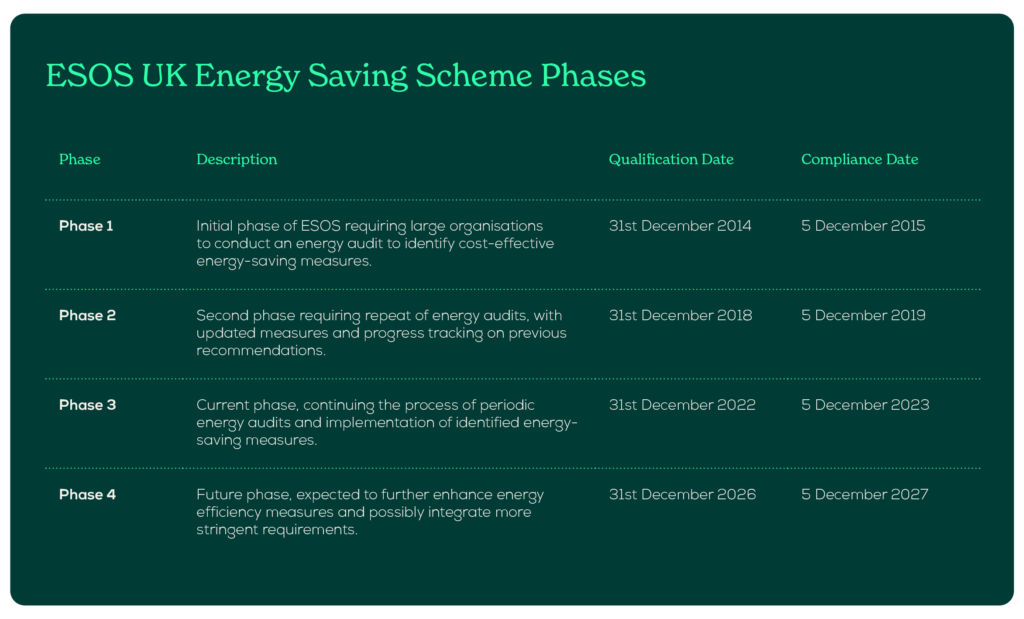Understanding ESOS: Your Guide to UK Energy Regulations
The UK Government has taken significant steps to promote corporate sustainability in recent years through a variety of regulations. The Energy Savings Opportunity Scheme (ESOS) was implemented in 2014 to promote mandatory energy assessment schemes, encourage streamlined energy efficiency management, and drive carbon and financial savings for affected businesses. After initially coming into effect in 2014, ESOS continued to develop compliance conditions to support the UK’s 2050 Net Zero goal. Subsequent phases introduced in 2019 and 2023, and culminating in the phase 4 compliance deadline on the 7th December 2027 aim to drive deeper action by building on previous requirements. These updates are designed to encourage more businesses to comply by increasing eligibility, enhancing energy efficiency, and accelerating carbon reduction across industries.
Phases

Key Requirements
The current compliance period of ESOS (enforced on the 6th of August 2024) is relevant for companies with:
- Employ over 250 people.
- Have an annual turnover of over £44 million, and maintain an annual balance sheet total of over £38 million.
Currently, ESOS doesn’t require small to medium-sized businesses (SMEs) to comply, which some critics see as a limitation of the regulation. However, it still impacts almost 12,000 UK businesses as of phase 2, with an updated figure expected in 2024 after counting the phase 3 compliance notifications.
Why the change?
ESOS was introduced to drive meaningful progress toward the UK’s energy efficiency and Net Zero targets. By standardising energy assessment and reporting requirements, ESOS simplifies compliance expectations for companies and enables regulators to evaluate performance. This approach enhances both environmental outcomes and economic savings by encouraging businesses to adopt energy-efficient practices.
The scheme promotes transparency and accountability, ensuring that participating companies actively contribute to national energy reduction goals. ESOS also fosters, prompting companies to explore new energy-saving technologies and strategies, ultimately supporting a more sustainable and resilient economy.
Regulatory impact
The scheme aims to drive significant reductions in energy consumption across industries. Through stringent requirements, ESOS transforms how companies approach energy efficiency within their operations. Each phase aims to add further requirements and increase the scope for eligibility.
For participating businesses, active engagement in identifying and implementing energy-saving measures is essential to achieve compliance and drive sustainability goals. By standardising compliance, ESOS creates new opportunities for companies that prioritise energy efficiency, increasing their competitive advantage while ensuring adherence to regulatory standards
Positive Planet’s role
Positive Planet plays a crucial role in guiding businesses through the ESOS phases. With expertise in carbon footprint measurement, carbon reduction planning, and regulatory compliance, Positive Planet offers tailored support to help companies meet all ESOS requirements effectively.
By assisting businesses at each stage of the scheme, Positive Planet empowers businesses to integrate energy efficiency into their business operations and sustainability strategies. This alignment with ESOS standards enables businesses to achieve regulatory compliance while advancing their sustainability objectives.
Next steps for businesses
Businesses already in compliance with phase 3 ESOS requirements should have confirmed their compliance notification by the 5th of June 2024. Affected businesses need to submit an action plan by the 5th of March 2025, providing expanded details on energy consumption calculations. They also must share ESOS report findings with members of their corporate group. Annual progress updates are also mandatory. Businesses should track energy use consistently throughout the reporting period to prepare updates due by the 5th of March 2026, and the 5th of March 2027.
For businesses not yet in the scope of phase 3, regular monitoring of performance is critical to avoid triggering compliance requirements, which could result in non-compliance penalties. These businesses should also stay informed of potential requirement updates as ESOS approaches phase 4 to assess if future compliance periods will apply to them.
Enquire today
If you would like to know more about how Positive Planet can help your organisation please get in touch.
